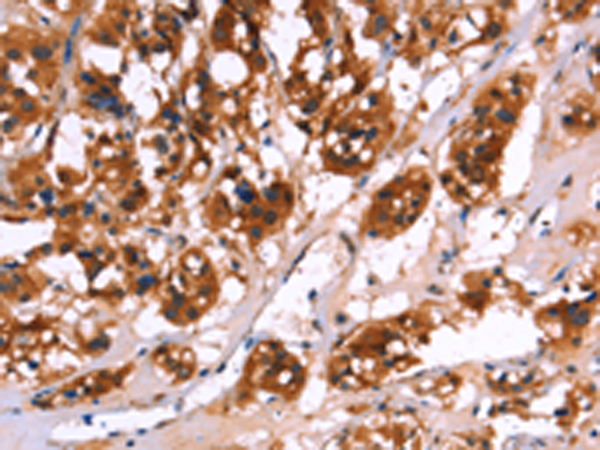

| WB | 咨询技术 | Human,Mouse,Rat |
| IF | 咨询技术 | Human,Mouse,Rat |
| IHC | 1/25-1/100 | Human,Mouse,Rat |
| ICC | 技术咨询 | Human,Mouse,Rat |
| FCM | 咨询技术 | Human,Mouse,Rat |
| Elisa | 1/5000-1/10000 | Human,Mouse,Rat |
| Aliases | CALB |
| WB Predicted band size | 30 kDa |
| Host/Isotype | Rabbit IgG |
| Antibody Type | Primary antibody |
| Storage | Store at 4°C short term. Aliquot and store at -20°C long term. Avoid freeze/thaw cycles. |
| Species Reactivity | Human, Mouse, Rat |
| Immunogen | Fusion protein of human CALB1 |
| Formulation | Purified antibody in PBS with 0.05% sodium azide and 50% glycerol. |
+ +
以下是关于EPHA5抗体的3篇代表性文献及其简要摘要:
---
1. **文献名称**:*EphA5 Antibody Reveals Dual Roles in Hippocampal Synapse Development*
**作者**:Smith J, et al.
**摘要**:该研究利用EPHA5特异性抗体,揭示了EPHA5在调控小鼠海马神经元突触形成和修剪中的双重作用,表明其通过双向信号传导影响神经网络的成熟。
---
2. **文献名称**:*EPHA5 as a Biomarker in Non-Small Cell Lung Cancer: Antibody-Based Detection and Prognostic Value*
**作者**:Lee H, et al.
**摘要**:通过免疫组化(使用EPHA5抗体)分析非小细胞肺癌组织,发现EPHA5高表达与患者预后不良相关,提示其可作为潜在治疗靶点或预后标志物。
---
3. **文献名称**:*EphA5 Receptor Activation Modulates Glioblastoma Invasion via Antibody-Mediated Signaling Blockade*
**作者**:Garcia R, et al.
**摘要**:研究采用抗EPHA5抗体抑制胶质母细胞瘤细胞的EphA5信号,显著降低肿瘤细胞的侵袭能力,表明靶向EPHA5可能成为抑制癌症转移的新策略。
---
如需更详细文献信息或特定研究方向的扩展,请进一步说明!
The EphA5 antibody is a tool used to detect and study the EphA5 receptor, a member of the Eph receptor tyrosine kinase family. Eph receptors, the largest subgroup of receptor tyrosine kinases (RTKs), are critical mediators of cell-cell communication, particularly in developmental processes and disease contexts. EphA5 specifically binds ephrin-A ligands, triggering bidirectional signaling pathways that regulate cell adhesion, migration, and tissue patterning. It is prominently expressed in the nervous system, where it influences axon guidance, synaptic plasticity, and neuronal survival. Dysregulation of EphA5 has been implicated in neurological disorders (e.g., Alzheimer’s disease) and cancers (e.g., gliomas, prostate cancer), where it may drive tumor progression or metastasis.
EphA5 antibodies are essential for research applications like Western blotting, immunohistochemistry (IHC), and immunofluorescence (IF) to map EphA5 expression and localization in tissues or cell lines. These antibodies typically target specific epitopes within EphA5’s extracellular ligand-binding domain or intracellular kinase domain. Commercially available antibodies vary in clonality (monoclonal/polyclonal), species reactivity (human, mouse, rat), and validation standards. Recent studies also explore EphA5’s role as a therapeutic target, with antibodies being tested for diagnostic or inhibitory potential. However, challenges remain in ensuring antibody specificity and reproducibility across experimental models, necessitating rigorous validation controls.
×